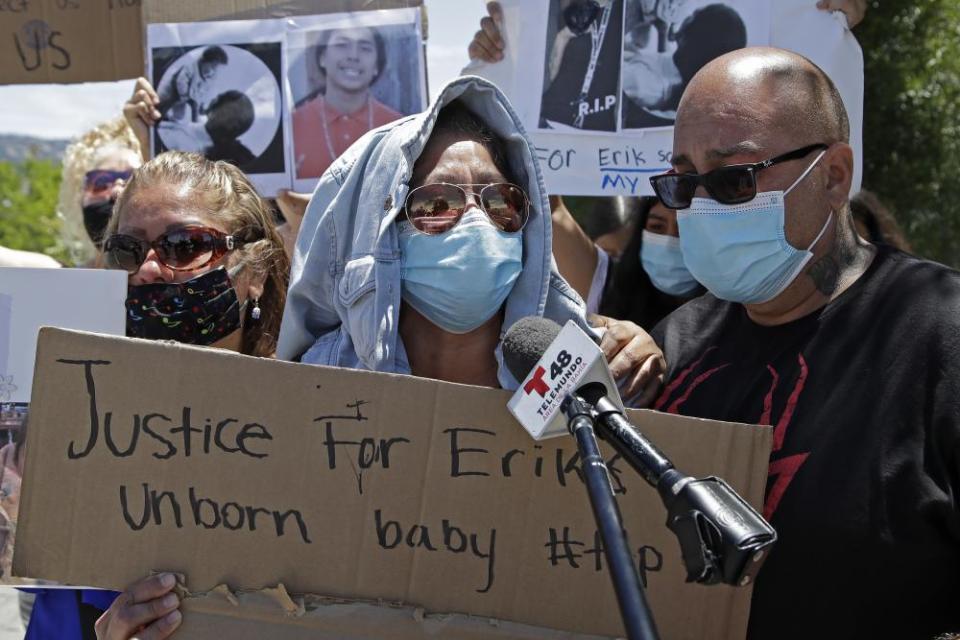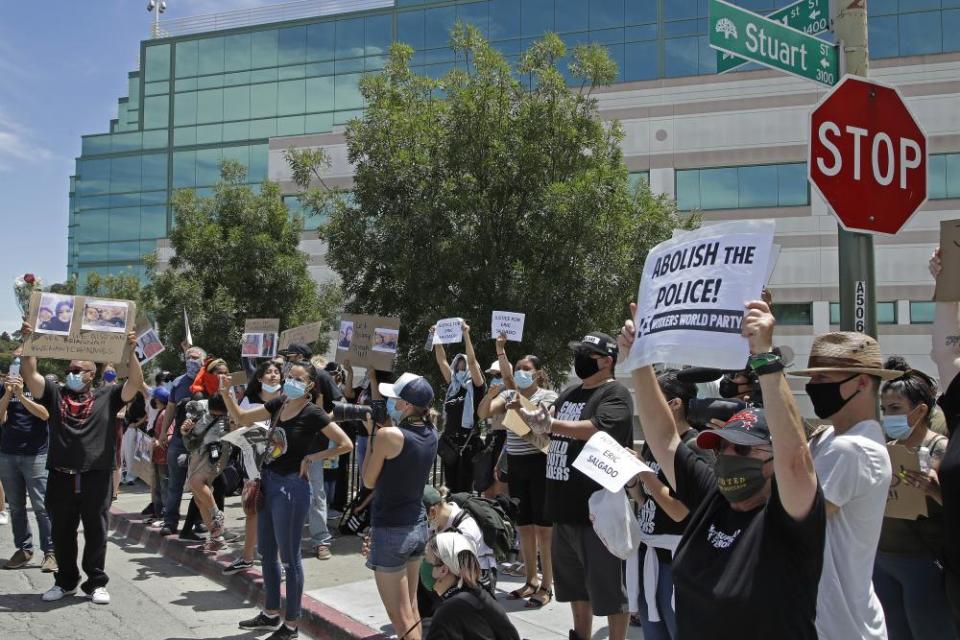‘We’re suffering the same abuses’: Latinos hear their stories echoed in police brutality protests
On Saturday night, just before 11, California highway patrol officers opened fire on the car Erik Salgado was driving in east Oakland, killing the 23-year-old and injuring his pregnant girlfriend.
It was the second time in four days that Bay Area law enforcement killed a Latino man suspected of property crimes. Sean Monterrosa, 22, was shot dead in Vallejo on 2 June by police responding to calls of looting. Monterrosa was on his knees when an officer opened fire through his car window, the city’s police chief said. .
The deaths of Salgado and Monterrosa were new tragedies unfolding even before the communities of color in the San Francisco Bay area had a chance to absorb the previous trauma.
Latino community activists say they hear their own stories echoed in the demand for an end to police brutality, with Salgado’s name only the most recent hashtag in a long and growing list of Latinos killed by police – cases that don’t always generate widespread media coverage.
“It’s important not to get caught up in the trap of oppression Olympics and compare our oppression against other groups”, said George Galvis, executive director of Communities United for Restorative Youth Justice (Curyj), an organization that supports youth impacted by incarceration.
“Latinos and Black communities have a common pain, a common oppression. But we’ve got our own martyrs.”
‘Questionable circumstances’
Salgado’s life came to an end just blocks away from the middle school in east Oakland he attended as a teenager.
On Monday, friends and family at his vigil recalled what they’ll miss about him: he was a good father to his three-year-old daughter, said his stepdad, Farid Majail. Always asking what his nephews needed, said his cousin. He liked video games and soccer and had plans for the future.
Related: 'Make it stop': George Floyd's brother calls on Congress to act over police violence
CHP said its officers on Saturday were attempting to conduct a traffic stop after spotting a red Dodge Challenger that had been flagged stolen from a nearby dealership that was hit by looters. Officers told Salgado and his girlfriend Brianna Colombo to exit the vehicle, according to the statement, at which point Salgado began “ramming CHP vehicles”. Three officers fired their weapons. Salgado was apparently unarmed.
Salgado died at the scene and Columbo, who was four months pregnant, was wounded and taken to the hospital. She survived, but family members said she was shot in the stomach and miscarried.
CHP has released few details about the shooting and its circumstances, raising questions among Salgado’s friends and family about the agency’s account.
John Burris, a civil rights attorney who is representing Salgado’s family, said he is still investigating the shooting, including what prompted officers to open fire and whether the car was stolen. “We’ve seen this too often where a potential looter has been shot and killed under very, very questionable circumstances. Looting is not a justification for deadly force,” said Burris.

Amanda Majail-Blanco, Salgado’s sister, told supporters on Monday, “Erik was a good daddy, he was a good brother, he was a good primo, a good dad.”
“He was a product of the streets like all of us are, a product of his environment,” she said. “That don’t make him a bad person. That don’t make him a criminal.”
Working toward real change
Between 2016 and 2018, Latinos in California made up 39% of the population but represented 46% of deadly police shootings – the second most disproportionate behind the rates for African Americans, according to an analysis from CalMatters.
The death of Andy Lopez, who was 13 when he was killed by a Sonoma county sheriff’s deputy, Erick Gelhaus, in 2013, ignited protest and community outrage. The officer said he mistook the pellet gun Lopez was carrying for an AK-47 assault rifle – circumstances that were hauntingly familiar to those surrounding the death of Tamir Rice, a Black child who was 12 when he was shot by Cleveland police in 2105 after being spotted with a pellet gun. Lopez was shot 7 times. Gelhaus was cleared of all charges.
Alex Nieto was 28 the night he walked to the top of a hill in San Francisco’s Bernal Heights neighborhood to eat a burrito. On the way, he drew the attention of passersby, one of whom called 911 to report that Nieto appeared to be carrying a gun. Nieto carried only a taser, one he needed for his job as a nightclub bouncer. Upon arrival, police said, Nieto pointed his taser at them, which they mistook for a firearm. Four police officers shot Nieto at least 14 times. A jury later cleared the officers of all charges.
Elena Mondragon, was 16 and pregnant in 2017 when she was shot and killed by Fremont police. Mondragon was a passenger in a stolen BMW pursued by police. When the driver attempted to drive through a roadblock, officers opened fire. Mondragon was struck five times.
Amilcar Perez-Lopez, an immigrant from Guatemala, was 20 years old when he was shot four times in the back and once in the head by two plainclothes San Francisco police officers in 2015. Police said they were responding to a confrontation over a bike. The district attorney cleared the officers of charges.
Perez-Lopez was one of at least 67 Latinos identified by the Guardian as killed by police across the US that year. Nearly 60% of them didn’t carry a gun; 25% were not armed at all.

“Our people are suffering the same abuses that haven’t been highlighted as much as what has happened to African Americans,” said Jessica Aguallo-Hurtado, who, along with her husband, is a member of the Brown Berets, an organization that advocates for Mexican-American rights.
“We’re on our own land but we’re seen as foreigners. Many of us are undocumented and don’t want come out of the shadows. We fail when it comes to coming together as a whole community.”
Aaron Fountain, a doctoral student at University of Indiana who has studied community reaction to police abuses, said other factors also play a role, among them: lack of Latino representation in newsrooms, and a lack of knowledge about historical abuses suffered by Latinos.
“I think in general Americans have a lack of knowledge of Latino history, including the fact that Latinos were lynched across the south-west,” Fountain said.
Civil rights attorney Arnoldo Casillas, who represented the family of Perez-Lopez, sees what happened to Perez-Lopez as a part of a pattern that extends beyond Latino communities and resonates with the broader movement happening now.
“The reason I believe we’re having this welling up is because people see the injustice. The oppressed are only going to be oppressed for so long,” Casillas said.
In the years since Perez-Lopez was killed, Casillas said he had become even more convinced that real change starts with police reform, a conversation that has been thrust forward as cities explore “defunding” police departments.
District attorneys must be more willing to prosecute cops for unjustified shootings, he said, and individual police officers must be held accountable.
“The threat of criminal prosecution has to be real, and cops have to know their claims of self-defense will be scrutinized before things will change.”
‘These cops will kill you’
Meanwhile in east Oakland, community organizers are demanding the immediate release of more information on Salgado’s death – including video footage of the incident.
Near the memorial constructed at the place where Salgado died, visitors on Monday lit candles, drank beer and wept over the memory of another friend lost to violence.
“That’s a piece of the car he was driving,” said a friend, pointing to a piece of plastic attached to a balloon.
At the vigil, a 62-year-old man said he repeatedly warns young people to stay away from police at all costs – a lesson he said he learned living in east Oakland as a Native American.
“I tell these kids, I beg them, these cops will kill you and get away with it.”

